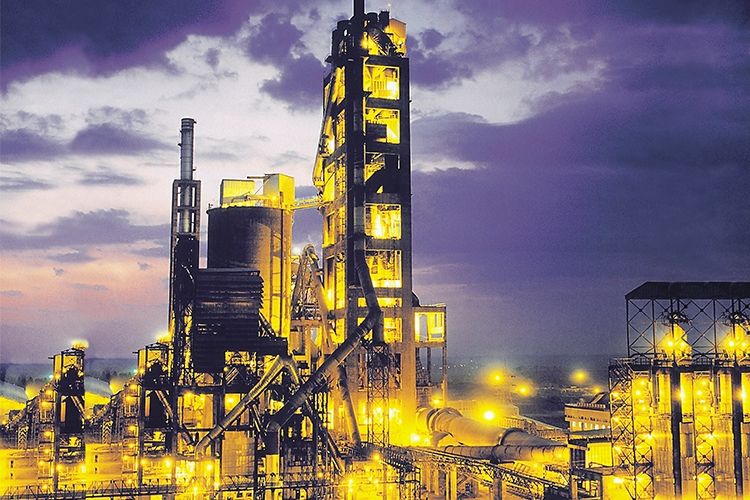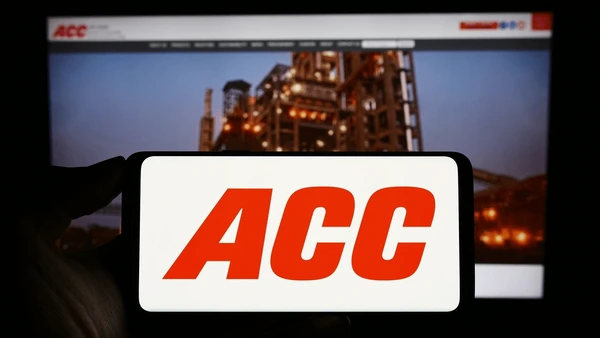ACC LTD Introduction
Among India’s top producers of cement and ready-mix concrete is ACC Ltd., formerly Associated Cement Companies Ltd. The growth of infrastructure and building in India has been much aided by the corporation. Acclaimed for its long-standing tradition, wide-ranging influence across India, and dedication to excellence, ACC is
Operating within the worldwide leader in building materials, Holcim Group, the corporation has given its activities worldwide context and enabled ACC to keep a strong competitive edge in India. Its headquarters are in Mumbai, Maharashtra; it has several plants and distributors all throughout India.
Since ACC’s goods are extensively employed in both home and business building projects, the company is a major participant in India’s real estate and infrastructure markets. Along with developing into other allied industries, including the manufacture of ready-mix concrete and other creative building materials, ACC has grown to be a reputable name for cement over years.

Why Is ACC Ltd. Important?
One of the leading companies in the Indian cement sector—known to be among the biggest cement marketplaces worldwide—ACC Ltd is Strong presence of the corporation in urban and rural sectors alike, where its products are utilized in high-rise buildings, bridges, highways, and different infrastructure projects reveals its impact.
ACC Ltd.’s past
Founded in 1936 as a cooperative venture among several manufacturers, ACC Ltd was initially Originally founded to meet India’s rising cement consumption amid its burgeoning urbanization and infrastructure, the company was
Important turning points:
- 1936: Started as a joint venture among various Indian businesspeople.
- 1944 saw ACC open its first cement plant, hence starting its production path.
- 1970s: ACC started manufacturing more widely and turned into a publicly traded business selling shares to investors.
- 2000s: The business grew by mergers and acquisitions, notably incorporating one of the biggest cement producers worldwide, Holcim.
In accordance with India’s rising need for infrastructure, ACC kept innovating in product offers and broadening its reach, particularly into ready-mix concrete.
Rich history of ACC Ltd. has seen the business negotiate changing rules, real estate market volatility, and economic crises. Over the years, the business has changed to enter new markets and concentrate on technology developments that would keep it current.
Business Operations of ACC Limiter
Two key businesses run by ACC Ltd are ready-mix concrete manufacture and cement production. From small homes to major construction firms, the organization is positioned to service a broad spectrum of consumers thanks to a network of sites scattered around India.
Products derived from cement:
Among the several cement products ACC makes are mixed cements, Portland pozzolana cement, and regular Portland cement. Residential, commercial, and infrastructure projects among other uses find applicability for these. Among the most identifiable names in the business is ACC Concrete, the main brand of ACC.
Concrete from ready-mix:
ACC has jumped into the ready-mix concrete business as demand for faster building techniques has grown. Often utilized in major infrastructure projects, this enables faster building.
Manufacturing plants:
Over ten cement facilities and more than fifty ready-mix concrete plants spread over India, ACC runs. Its cement production activities are spread throughout several areas of India, which provides a wide distribution network enabling it to meet national as well as local demand. The arrangement of the plants is deliberate to maximize logistics and control expenses.
Technology Integration:
ACC is also dedicated to maximize production and lower its carbon footprint by means of sophisticated technologies. In order to guarantee continuous product quality and increase productivity, the corporation has moved significantly toward automation in its factories.
Overview of Stock
Under the symbol ACC, ACC Lt. is publicly traded on the Bombay Stock Exchange (BSE) and the National Stock Exchange (NSE). Particularly preferred by long-term infrastructure and construction sector investors, the company’s stock is sometimes regarded as a steady investment. ACC’s stock has fluctuated throughout time; periods of expansion driven by rising demand in the building industry as well as economic situations influencing investor attitude have caused swings.
Stock Performance in Current Years:
Though like many other equities, ACC’s stock has showed generally good growth over the years; it does have moments of volatility. More general market variables such interest rates, inflation, and domestic economic performance often affect the stock price of the corporation. Being closely related to the development of infrastructure, the cement industry has also had times of expansion upon the announcement of significant infrastructure projects.
Global economic events including increasing material costs, interruptions in international supply chains, and government regulations impacting building and materials have shaped the stock in recent years.
Factors influencing ACC’s stock price:
Costs of Raw Materials:
Variations in the cost of raw materials including limestone, coal, and gypsum can directly affect ACC’s profitability and, hence, stock price.
Interestrates:
Changes in interest rates have great impact on the building sector, which influences demand for fresh building projects.
Investor Sentiment:
Short-term investor mood can be affected by news on mergers, acquisitions, and financial outcomes.

Factors Affecting the Share Price of ACC Ltd.
The stock performance of ACC Ltd. is influenced by several elements. These cover company-specific as well as macroeconomic aspects. Among the main elements are these:
Macroeconomic considerations:
Interestrates:
The cement business depends mostly on capital. Rising interest rates could result in more expensive borrowing for infrastructure projects, so lowering demand for cement and hence ACC’s products. On the other hand, reduced rates encourage building activity, hence increasing demand.
Government Policies:
Policies supporting either tax changes or infrastructure development can have a big effect on ACC’s shares. Historically, the drive by the Indian government for infrastructure development and urbanization has helped cement producers like ACC.
Inflation:
Rising inflation can cause raw material prices to rise, therefore influencing ACC’s margins and earnings.
Factors particular to a sector:
Demand for Building:
Demand for cement has direct bearing on building activities. slowed down infrastructure and housing developments could lower ACC’s income.
Problems in the supply chain:
Raw material availability and cost fluctuations—including those related to fuel—may influence ACC’s manufacturing costs.
Factors Unique to a Company:
Plans of expansion:
Strategic strategies of ACC to increase production capacity or penetrate new markets can favorably affect its stock price.
Mergers and acquisitions:
Strategic acquisitions or alliances, such Holcim’s ongoing impact, can cause stock price swings depending on investor view of growth prospects.

ACC Ltd.’s financial situation
Strong financial performance by ACC Ltd. has helped to build their reputation as among India’s most dependable cement producers. The company’s financial results clearly show its operational effectiveness, market orientation, and capacity to resist economic swings.
Profit patterns and revenue:
Driven mostly by the growing need for cement in both urban and rural building, ACC Ltd. has seen consistent income increase throughout the years. The sales of the corporation may show the larger patterns in the housing and infrastructure sectors. The increase in infrastructure projects motivated by government and private sector investments has lately helped ACC’s income to be favorable.
But even if income has been rising consistently, the rising cost of raw materials and running expenses have caused some variation in profits. Still, ACC has kept its profit margins by streamlining manufacturing and distributing some of the cost hikes onto customers.
Key Ratios in Finance:
Price to Earnings (PE) Ratio:
Investors have been particularly interested in ACC’s PE ratio since it provides understanding of the stock’s valuation. A rather high PE ratio can suggest either investor expectation of future growth or overvaluation of the company.
EPS, or earnings per share:
An important indicator of the fraction of the profit distributed to each outstanding share of common stock is the EPS for ACC. Dividend-seeking investors find ACC appealing since over the years its EPS has exhibited positive expansion.
Equity’s return on equity (ROE):
With a good ROE, ACC shows that it can turn a profit from the equity of its owners. A high ROE points to sound financial health and efficient management.
Results Quarterly and Annually:
The quarterly results of ACC show a good operational performance, particularly in times of great building activity. Still, seasonality in building demand could affect the company’s success. For instance, the monsoon season usually causes a halt in building projects, therefore influencing general performance.
Recent Performance Analysis:
For instance, ACC saw a minor decline in profitability in the recent quarters resulting from inflation and problems in the worldwide supply chains. Still, the company’s emphasis on operational efficiency, robust demand in the housing market, and government-driven infrastructure projects helped to offset the effects.
Recent Patterns in Stock Price of ACC Ltd.
Affected by both local and global elements, ACC Ltd’s stock has displayed notable volatility recently. Nonetheless, given consistent long-term success, it remains a favorite investment for investors.
Stock Rising and Falling:
ACC’s stock has had both periods of stagnation and increasing tendencies in the last few years. Usually, announcements of major infrastructure projects, good quarterly performance, and favorable market circumstances have connected the increase in stock prices. On the other hand, ACC’s stock saw temporary drops in times of global uncertainty, such the COVID-19 epidemic or during spikes in raw material prices.
Stock Performance in 2024–2025:
Notwithstanding macroeconomic difficulties, ACC’s stock price has showed durability over 2024 and into 2025. The company’s constant emphasis on cost control and sustainability as well as the significant comeback in India’s building industry following the epidemic have been key elements determining its performance over this period. The revelation of fresh government infrastructure projects including road-building initiatives has also positively affected ACC’s stock performance.
Investor Feelment:
Thanks in large part to ACC’s emphasis on sustainability, operational excellence, and creative building materials, investor attitude toward the company has usually been favorable. The growing attention on green construction solutions has also positioned ACC as a leader in this niche, therefore improving the appeal of its stocks to long-term investors.
Government Policies Affecting ACC Ltd
The performance of the cement sector is much shaped by government policy; ACC Ltd is no exception. Policy choices with an eye toward infrastructure, urban growth, and environmental rules have big effects on ACC’s business.
Governmental Infrastructure Projects:
Large infrastructure projects aiming at improving the roads, housing, and urban infrastructure of India have often been announced by the government. This has been a main cause of the cement demand. For example, the government’s drive for homes via programs like Pradhan Mantri Awas Yojana (PMAY) has stimulated more building activity, hence helping cement producers like ACC. These projects directly affect cement demand, thereby increasing ACC’s stock price and revenues.
Environmental Guidelines:
ACC is obliged by strict environmental rules established by the government. One of the biggest carbon emitters is the cement sector, hence rules on carbon emissions, waste management, and energy usage are under more and more importance. In response to these rules, ACC has embraced low-carbon technologies, energy efficiency, and alternative fuels, therefore fostering sustainable practices.
Policies on Taxes and GST:
Moreover affecting the company’s pricing practices and profit margins are changes in tax and GST rules. Although the Goods and Services Tax (GST) helped India’s tax system to be simpler, changes in tax rates on raw materials and cement can influence ACC’s cost structure. The business has to also adjust to changing raw material prices, which might affect its margins.
Cement Industry Competency
With several big companies vying for market share in the Indian cement industry, ACC Ltd works in a very competitive field. Smaller regional cement producers add to the competition alongside well-known companies.
Main rivals of ACC Ltd:
ultraTech cement:
One of the largest companies in the Indian cement business, UltraTech is a fierce rival to ACC thanks to its vast manufacturing network and market reach.
Ambuja cement is:
Comprising the Holcim Group, Ambuja Cement also has ACC as its parent company. Still, the two brands run separately and fight for market share in certain divisions.
Shree cement is
Another main rival of ACC is Shree Cement, well-known for its efficiency and significant market presence.
Cement Dalmia Bharat:
Dalmia Bharat competes directly with ACC in numerous areas and has a big presence in the Indian cement market.
How ACC Stans Out:
Through its lengthy history of brand trust, operational efficiency, and product innovation, ACC has created a niche for itself despite great rivalry. Furthermore differentiating ACC in a crowded market is its dedication to sustainability and acceptance of green technologies.
Furthermore, Holcim, the parent company of ACC, offers it access to worldwide best practices and ideas that improve the market competitiveness and product offers.
Corporate social responsibility (CSR) and sustainability
For ACC Ltd., sustainability has lately taken front stage. ACC, a conscientious business, has been trying to lower its environmental impact and return to the community via different CSR projects at the same time.
dedication to environmental sustainability:
Aiming high for lower carbon emissions and more energy-efficient operations, ACC has To lower its whole environmental effect, the company has upgraded its manufacturing techniques and made investments in renewable energy sources. To assist lower reliance on fossil fuels, one of ACC’s main projects is running its cement plants on alternative fuels, such industrial waste.
Business Social Responsibility (CSR):
Through many CSR initiatives, ACC is also committed to returning benefits to society. These initiatives center on things such rural development, healthcare, and education. Recognition and improved public image for ACC have come from its initiatives in water conservation and community empowerment in rural regions.
The way the corporation interacts with nearby communities reflects its dedication to sustainability as much as its running policies. By including social and environmental responsibility into its main business model, ACC improves its position in the market and builds goodwill with clients and investors equally.
Analyst Views of ACC Ltd Stock
Regular analysis and forecasts on ACC Ltd by investment experts enable investors to make wise decisions. These points of view are grounded in the company’s performance, state of the market, and more general economic trends.
Analyst Notes:
Within the cement sector, most experts consider ACC Ltd as a stable and rather low-risk stock. Strong market position of the company, constant revenue increase, and wide geographic reach help to explain this stability. For long-term investors, the company is usually graded as a “buy” or “hold,” hoping that the cement industry will keep gaining from India’s urbanization and infrastructural expansion.
Target Cost:
Target prices for ACC’s stock are usually determined by analysts according on future growth forecasts, state of the market, and predicted changes in raw material prices. Though analysts mostly base their assessments on the company’s sustainable growth potential, strategic objectives, and long-term market trends, the target price swings.
Risks of Investment:
Although ACC is seen as a wise investment, experts nevertheless draw attention to some hazards. These cover changing input costs, legal difficulties, and the cyclical character of the cement business. Should building activity slow down or cause disruptions in world supply networks, ACC’s stock may temporarily drop. Nonetheless, most experts remain hopeful about the company’s long-term future given its strong foundations and commanding market share.
Effect of Global Elements on Stock of ACC Ltd.
Like many Indian enterprises, ACC Ltd is not exempt from world economic events. Its operations, expenses, and stock performance might all directly be affected by these outside factors.
worldwide need for cement:
Being a worldwide actor, ACC gains from the rising cement demand in developing nations. This is especially crucial since worldwide building needs also influence the demand for cement, not only from home infrastructure initiatives. Companies like ACC are positioned to grow their export operations as nations all throughout Asia, Africa, and the Middle East raise their infrastructure spending.
Raw material price fluctuations:
On the world market, basic resources including coal, limestone, and gypsum have somewhat erratic values. Like other cement companies, ACC has to control these swings closely. For instance, rising global coal prices immediately impact profitability and manufacturing costs. Likewise, ACC may experience delays and higher costs should global supply networks be disrupted (e.g., by geopolic tensions or pandemics).
Change in Exchange Rate:
Variations in the Indian Rupee (INR) exchange rate might affect ACC’s cost of production and profit margins since it deals internationally with suppliers and consumers. Although a stronger Rupee can save imported raw material costs, if the business exports to foreign markets it could reduce export income.
Global Economic Slows:
Investor mood and stock performance can change with economic slowdowns in major markets including North America and Europe. Global economic downturns sometimes result in lower demand for building and infrastructure development, which can slow down cement industry growth.
Future Outlook of ACC LTD
Looking ahead, ACC LTD’s chances seem to be tightly related to the expansion of India’s infrastructure industry and the company’s capacity to adjust to evolving market conditions.
India’s infrastructure is growing:
The government of India has given infrastructure development considerable attention; projects like highways, railroads, and urban housing are expected to generate cement demand for years to come. Particularly in the highly sought-after areas of roads and housing, ACC stands to gain greatly from these advancements.
Environmental sustainability and innovation:
ACC is dedicated to lead the way in cement industry sustainability. As environmental rules tighten worldwide, the company’s emphasis on manufacturing low-carbon cement and implementing green technologies is probably going to become even more critical. Maintaining its competitive edge in the market will depend critically on this forward-looking strategy.
Technological Advancements:
In order to enhance its manufacturing techniques and client offers, ACC is also funding technology projects. Data analytics, artificial intelligence, and automation used to operational optimization can help to save costs and raise efficiency. Furthermore, developments in product offers—such as environmentally friendly cement solutions—will probably keep ACC relevant in a market growing more and more sustainability-oriented.
Expanding the market:
Though ACC has a strong presence in India, unexplored foreign markets could present chances for development. ACC might look at chances to boost its exports or create strategic alliances with foreign firms as global building demand keeps rising.
Forecasts for stock prices:
The ongoing strength of the Indian cement market will probably help ACC’s stock in the medium-to-long run. Although short-term volatility are unavoidable, particularly considering the cyclical character of the sector, long-term investors are probably going to witness expansion as the business takes advantage of India’s fast developing infrastructure.
Conclusion
Having a long history of excellence and innovation, ACC Ltd is among the most venerable cement producers in India. Benefiting from its large global reach, varied product range, and dedication to sustainability, the company has shown durability across several economic cycles.
ACC has profited recently from the rising demand for cement brought on by India’s infrastructural explosion. Leading in both conventional cement production and more recent, environmentally friendly product lines including green cement and ready-mix concrete, the company has positioned itself.
Long-term investors find ACC appealing despite periods of volatility in its stock since the company’s outstanding financial performance combined with favorable market trends in India’s building industry appeal. Still, its performance will be much shaped by other elements such government policy, raw material pricing, and world economic conditions.
With its wide market presence, creative strategy, and solid financial health, ACC offers investors wishing to participate in the Indian cement sector a balanced blend of stability and growth opportunity.
FAQs
Q1: For what is ACC Ltd most recognized for?
Ans;- Renowned for its premium cement products, ACC Ltd is among the top companies in the Indian cement sector. It also is rather prominent in the market for ready-mix concrete.
Q2: Recent stock performance of ACC Limited?
Ans;- Various macroeconomic events have caused swings in ACC’s stock; yet, overall it has showed long-term expansion because of great demand in the infrastructure industry.
Q3: What elements affect the stock price of ACC Limited?
Ans;- Factors including raw material costs, government policies, interest rates, infrastructure demand, and world economic situation affect ACC’s stock price.
Q4: Should one invest in ACC Ltd.?
Ans;- For long-term investors particularly, ACC Ltd is regarded as a steady investment. The company is appealing because of its strong market presence and expansion chances in the cement sector.
Q5: How sustainable is ACC?
Ans;- ACC is dedicated to lower its carbon footprint and implementing environmentally friendly methods of running its business. The business advocates low-carbon products and makes investments in environmentally friendly technologies.



